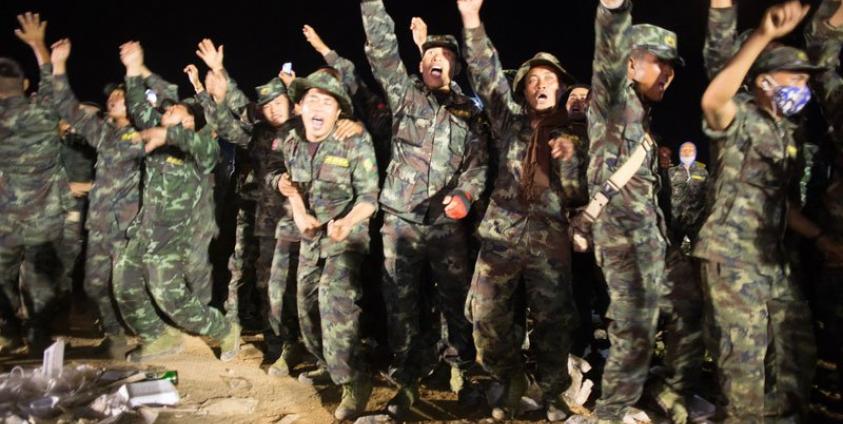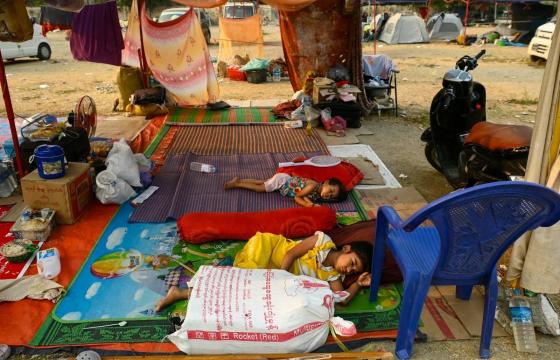Every year the Restoration Council of Shan State Shan State Army (RCSS/SSA) holds a massive celebration for Shan National Day on 7 February at their mountaintop headquarters at Loi Tai Leng in Shan State, Myanmar, close to the Thai border.
The event, which attracts Shan people from all across Shan State and Myanmar, appears to be a mixture of a vast country fair and military parade, but it is a bit more than that.
It is also an opportunity for the RCSS/SSA to show off their troops, show that they have the support of not only many regular Shan people but also the other ethnic armed organisations (EAOs) who send representatives and from countries such as Switzerland, Italy, New Zealand and Turkey who all officially sent staff from their Yangon embassies. They also invite journalists who get the rare opportunity to meet and talk to senior RCSS/SSA members all in the same place.
The whole event is recorded by a vast number of cameras and drone equipped soldiers from the formidable RCSS/SSA information department so that those who could not make it to the event can still see the might and widespread support of the RCSS/SSA.
However, the celebrations are not just for the benefit of outsiders. On the following day, 8 February, after most of the outsiders have left, the RCSS/SSA hold an event to honour their troops by treating them to food, drinks and a concert. The event also doubles up as a birthday celebration for RCSS/SSA chairman and commander in chief, Lieutenant General Yawd Serk.
The RCSS/SSA, also known as the Shan State Army-South (SSA-S) has become the biggest Shan EAO.
Originally, Yawd Serk was an officer in Khun Sa’s Mong Tai Army (MTA). Despite their claims that they were fighting for the Shan people, the MTA was regarded as a drug running organisation producing, processing, taxing and exporting opium, though within its ranks there were a few whose aims were more political.
When Khun Sa surrendered with his troops to the Burmese Government in 1995 Yawd Serk, and his men refused and instead in 1996 became the SSA-S. The political wing of the organisation, the RCSS, was formed in 2000.
Unlike the MTA the RCSS/SSA have always been avowedly anti-drugs. They say that their only interest is to protect the rights of the Shan people and ensure that a federal Shan State becomes part of a federated Myanmar. They claim to have never profited from the drug trade and say that they are completely funded from taxes levied on businesses in areas under their control and increasingly also donations from successful Shan businessmen both inside and outside Myanmar.
They have done this by stoking the Shan sense of pride and identity and painting themselves as the best people to fight and represent Shan interests. The group’s information department makes sure that their message reaches all Shan people, whether in Shan State or abroad.
Not only has this bought the funds rolling in it also means, according to the RCSS/SSA, that they no longer need to use conscripts as there are enough volunteers. Certainly, all the low ranking soldiers Mizzima spoke to said they were volunteers, and all said they were there because they saw it as their duty as Shans to fight for their people and serve at least one five year term as an RCSS/SSA soldier.
The RCSS/SSA signed a state level ceasefire with the government in 2011 followed by a union level ceasefire in 2012. Despite this, their troops still regularly clashed with government troops. In 2015 the RCSS/SSA were one of the eight groups that signed the Nationwide Ceasefire Agreement (NCA). Since then they have still been fighting with government forces, but less frequently.
The RCSS/SSA never reveal how many troops they have, but the latest (2016) Myanmar Peace Monitor estimates that they have over 8,000 soldiers.
After they were formed, the SSA-S decided to base themselves at Loi Tai Leng, a windswept mountain ridge with Thailand below it on one side and Myanmar below it on the other. Previously Khun Sa, for a fee, had ferried refugees from fighting in Shan State through Loi Tai Leng into Thailand until the Thais clamped down on their movement.
The SSA-S have always had good relations with the Thai authorities. There are a number of reasons for this. The Shan, who call themselves Tai, are ethnically far more similar to the Thais across the border in northern Thailand than they are to the Burmans. The Shan and Thai see themselves as belonging to the same family and they have very similar languages, traditions and beliefs. Also the RCSS/SSA’s anti-drug stance meant that they would not try to import drugs into Thailand.
The actual Shan National Day Parade took place on the morning of 7 February. Pride of place on the stage was given to Yawd Serk and specially guests. Notably, these included General Mutu Say Poe, the chairman of fellow NCA signatories, the Karen National Liberation Army who shared a table with Yawd Serk. Also present were representatives from all the EAOs who have signed the NCA. Surprisingly there was also a representative of the UWSA who came on behalf of their southern Shan State-based troops against whom the RCSS/SSA had fought in 2005. There were also representatives from the government.
The first part of the celebrations was a military parade. It included military bands, marching, demonstrations by the Special Forces, a hostage rescue drill and school boy martial artists amongst other things.
Yawd Serk addressed the crowd, then it was the turn of the visiting dignitaries to speak, either in Burmese or their own language. Unfortunately, most of the Shan soldiers who had to stand listening on the parade ground in the sun could not understand what was said, but at least there were medics to take away those who fainted.
After the parade Yawd Serk had his customary press conference. Unsurprisingly, he did not make any great revelations during the meeting and essentially just re-iterated official RCSS/SSA policy.
He said that the RCSS/SSA would try to support Shan refugees in the border areas now that donors had cut aid to them.
In regards to the fighting between the RCSS/SSA and the non-NCA signatory TNLA in northern Shan State, he claimed that negotiations were underway with the TNLA and that the fighting was a misunderstanding that must be overcome because there has to be unity between EAOs if the peace process is to succeed.
The reality appears to be somewhat different. According to senior RCSS/SSA sources who wish to remain anonymous negotiations have only been held between mid-level officials from each group and they have pretty much stalled for the time being because the TNLA say they will only hold talks if the RCSS/SSA move all their troops out of northern Shan State whereas the RCSS/SSA demand that the TNLA produce 23 Shan civilians taken by the TNLA who are now believed to be dead.
Yawd Serk also seemed to be confident in the peace process saying that he believed it would work, but that it would take time. He did come across as committed to the process and genuinely seems to believe that it is the best way for the Shan to achieve their goal of federalism.
But, when asked about fighting between the Tatmadaw and the RCSS/SSA Yawd Serk put the blame firmly with the Tatmadaw and said that they had broken the ceasefire. When asked if he thought the attacks were accidentally carried out by mid-ranking officers or whether there had been orders to attack the RSS/SSA he emphatically said that he believed that it was an order from the top. He clarified by saying that he believed the decision to attack the RCSS/SSA had come directly from Min Aung Hlaing, the Tatmadaw Commander-in-Chief, adding that he did not believe that the army sincerely wanted the peace process to succeed.








